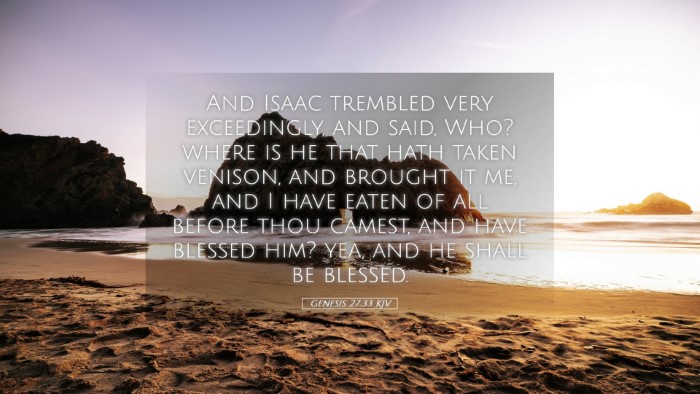Commentary on Genesis 27:33
Text of Genesis 27:33: "And Isaac trembled very exceedingly, and said, Who? Where is he that hath taken venison, and brought it me? and I have eaten of all before thou camest, and have blessed him? yea, and he shall be blessed."
Introduction
Genesis 27:33 captures a pivotal moment in the narrative of Isaac and his sons, Jacob and Esau. This verse reveals Isaac's immediate reaction upon discovering that he had been deceived and that his blessing had been granted to Jacob instead of Esau. The theological implications and emotional depth found in this moment provide rich insight for scholars and church leaders alike.
Isaac's Trembling
Matthew Henry notes that Isaac's excessive trembling may indicate profound unease and disquiet. This reaction is not merely physical; it signifies the gravity of what has just transpired. Isaac's realization of the deceit reflects the tumultuous relationship among the characters and highlights the struggle between divine sovereignty and human agency.
Albert Barnes elaborates on this trembling, suggesting that it symbolizes Isaac's recognition of the irreversible nature of the blessing he had just conferred. The act of pronouncing a blessing in ancient times was believed to carry immense, often unbreakable weight, thereby eliciting a visceral response filled with awe and dread.
The Significance of the Blessing
The urgency in Isaac's words, "Who? Where is he that hath taken venison," underscores his confusion and disbelief. Adam Clarke emphasizes that this moment illustrates a critical turning point for Isaac, who is confronted with the implications of his actions and their impact on God's covenant promises. The blessing he had bestowed was not merely a familial rite; it was an integral part of God’s plan for His chosen people.
Moreover, the phrase "yea, and he shall be blessed" signals acceptance of the irreversible decree he had unknowingly facilitated. Isaac acknowledges Jacob, recognizing that despite the deception, the blessing is now firmly placed upon him, adhering to God’s overarching narrative of election and grace.
Theological Insights
- Divine Sovereignty: This passage illustrates the tension between human deceit and divine choice. God's purposes prevail despite human failings. The tension between Jacob's cunning and the sovereign plan of God opens an exploration of how God often uses imperfect vessels to fulfill His divine will.
- Human Responsibility: The vivid depiction of Isaac's emotional turmoil serves as a reminder of the consequences of human actions. While God's plans are sovereign, they are often carried out through the moral choices of individuals, prompting considerations about ethical behavior and consequences within a faith community.
- Covenantal Themes: Isaac’s blessing is a continuation of the Abrahamic covenant, which emphasizes blessings, lineage, and the future of Israel. This incident marks a significant moment in the unfolding of God’s covenant with His people, which continues to resonate throughout biblical history.
Emotional and Moral Reflection
There is much to be learned from the emotional undertow of this moment. Isaac’s trembling serves as a potent reminder of the vulnerability of humanity in the face of deception. Pastors and leaders might reflect on how this moment of revelation brings forth the essential truth of humility in the face of God’s plans, often beyond our understanding. Each character's flaws may offer a mirror to our own lives, encouraging personal reflection on the nature of deception, blessing, and our interactive role within the divine story.
Conclusion
Genesis 27:33 not only serves as a climactic moment in a familial saga but also serves up profound theological truths about God’s sovereignty, human agency, and the weight of blessing. As church leaders and scholars delve into this scripture, they are invited to examine the dynamics of God's grace amidst human complexities, seeing both the divine hand in the unfolding story and the moral responsibility each character—just like each of us—holds in their choices. This exploration enriches the understanding of God's dealings with humanity, inviting a deeper appreciation of His grace intersecting with human narratives.


